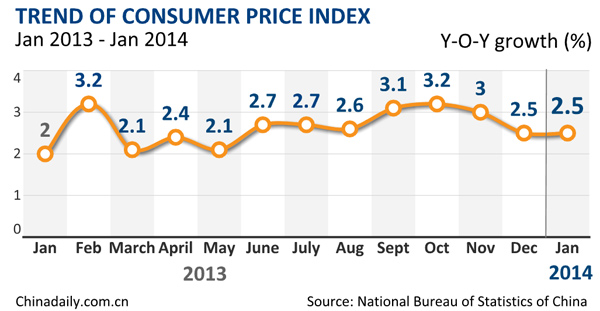
BEIJING - China's consumer price index (CPI), a main gauge of inflation, rose 2.5 percent year on year in January, unchanged from December and slightly above the market consensus of 2.4 percent, official data revealed on Friday.
The January inflation data included a higher-than-expected rise in non-food inflation, reflecting strong demand during the Chinese New Year period for recreation and household services.
These rises were partly offset by a decline in food inflation thanks to warm weather and the Chinese government's frugality and anti-graft campaign.
Economists expected low CPI inflation could persist for several months, given the negative producer price index (PPI) inflation, strong Chinese currency and weak global commodity prices.
With subdued inflation, the Chinese central bank has enough room to push forward with financial reforms in 2014 while keeping the current monetary policy status quo in place over the coming months to support growth, they said.
Low food inflation
According to the National Bureau of Statistics (NBS), January's CPI inflation rose 2.6 percent in cities, and 2.2 percent in rural areas.
Food prices, which account for roughly a third of the CPI, rose 3.7 percent year on year in January, down from a 4.1-percent increase in December. Prices of non-food products edged up 1.9 percent last month, the bureau said.
In the food category, fruit, milk, beef, mutton, aquatic products and fresh vegetables all rose year on year last month. Fruit prices led the way by jumping 23 percent from a year ago.
Notably, prices of pork, eggs and cooking oil contracted 4.3 percent, 3.8 percent and 4.8 percent year on year in January, respectively, according to the NBS.
Prices of tours and outings soared 14.9 percent last month, as many Chinese chose to travel within China or abroad to celebrate the Chinese New Year, which fell on January 31.
Prices of household services and processing and maintenance services rose 9.2 percent last month, largely because of a labor shortage as many workers returned to their hometowns for the Chinese New Year.
On a month-to-month basis, January's CPI grew 1 percent from December. Food prices in January rose 2.4 percent from the previous month, while prices of non-food products edged up 0.3 percent.
Lu Ting, chief China economist with Bank of America Merrill Lynch, attributed lower food price inflation despite upward distortion by the Chinese New Year to three factors.
First, unusually warm weather in January kept vegetable production and transportation costs low. The government's frugality campaign curbed holiday food consumption demand, especially for pork. Finally, pork supply was abundant but demand failed to catch up, he said.
Meanwhile, China's producer price index (PPI), a main gauge of inflation at the wholesale level, contracted 1.6 percent year on year in January, following a 1.4-percent drop in December, according to the NBS.
Related Readings:
